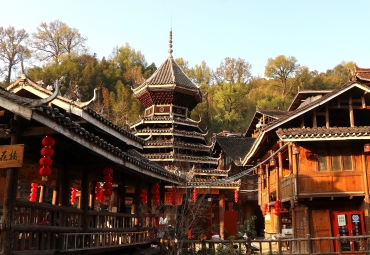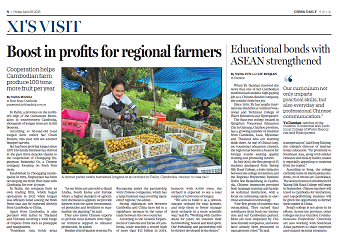A national treasure

Dove trees in blossom on Mount Fanjing. The tree is a world treasured species. [Photo provided to China Daily]
As long as it's not raining, Yang will get out of the station and explore the mountain in search of the monkeys.
He has sometimes come across 300 to 400 monkeys.
"They wander at will, without fixed tracks," Yang says.
"You can often find them hanging on a tree and basking themselves in the sunshine or grooming their hair."
Sometimes, a fight between male monkeys will erupt.
Over the past three decades, Yang has rescued and helped breed more than 50 golden monkeys.
"They are like kids, and you have to take care of them by feeding them and keeping them company," he says. They are fed fresh leaves and fruits.
"They have a thin stomach wall and rely on food with high fiber to enhance digestion, and food rich in starch should be avoided," Yang says.
Their enclosures also have to be cleaned and sterilized on a daily basis.
"It requires patience to be with these animals, to know their character and habits," he says.
The golden monkeys under Yang's care have grown accustomed to his presence, but, if strangers get too close, they might exhibit aggressive behavior, he warns.
Golden monkeys are an important part of Fanjingshan's biodiversity, and staff members at the reserve have worked to increase their number and record their lives in order to understand how the animals and people can better coexist with each other.
Some of the monkeys at the rescue center have to go through long-term re-wilding training and health monitoring before being released fully back into the wild.
"They might carry some human illnesses, while their wild counterparts don't have the corresponding antigens," explains Yang Wei, deputy director of the rescue center at the reserve.
At the moment, plans for related work to build Fanjingshan into a national park have been finished and submitted to the National Forestry and Grassland Administration.
Experts say Fanjingshan has an advantage in its application to become a national park in that it is the only natural habitat for the Guizhou snub-nosed monkey and the Fanjingshan fir, both of which have been rated as threatened species by the International Union for Conservation of Nature.
The Guizhou provincial forestry bureau will strive to protect habitats for rare wild animals at Fanjingshan and step up rescue efforts to cover more species.
Li is excited about the prospect of Fanjingshan becoming a national park.
"It will be another historical event after the UNESCO recognition," Li says, adding that he will continue to do his part to protect the mountain.
Wang Jin contributed to the story.
All rights Reserved. 京ICP备13028878号-8







 Overview
Overview Guiyang
Guiyang Guian New Area
Guian New Area Liupanshui
Liupanshui Anshun
Anshun Qianxinan
Qianxinan Qiandongnan
Qiandongnan Qiannan
Qiannan Zunyi
Zunyi Tongren
Tongren Bijie
Bijie Guizhou commits to culture preservation and rural vitalization
Guizhou commits to culture preservation and rural vitalization Guizhou voice at 2025 national two sessions
Guizhou voice at 2025 national two sessions Meet the 'genius moms' at Shenzhen cultural fair
Meet the 'genius moms' at Shenzhen cultural fair 

